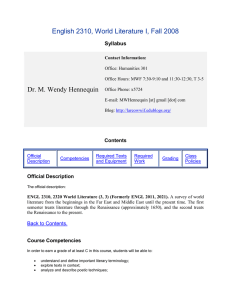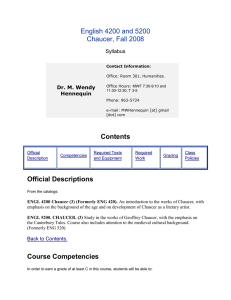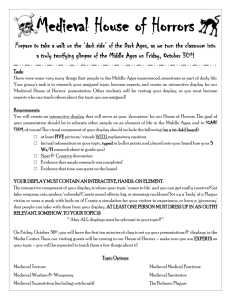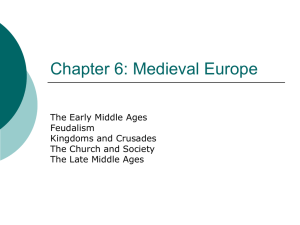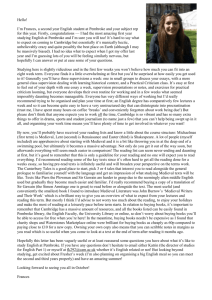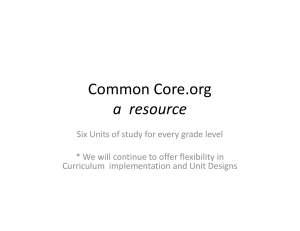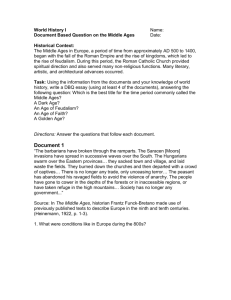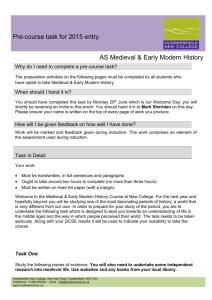Spring - Tennessee State University
advertisement
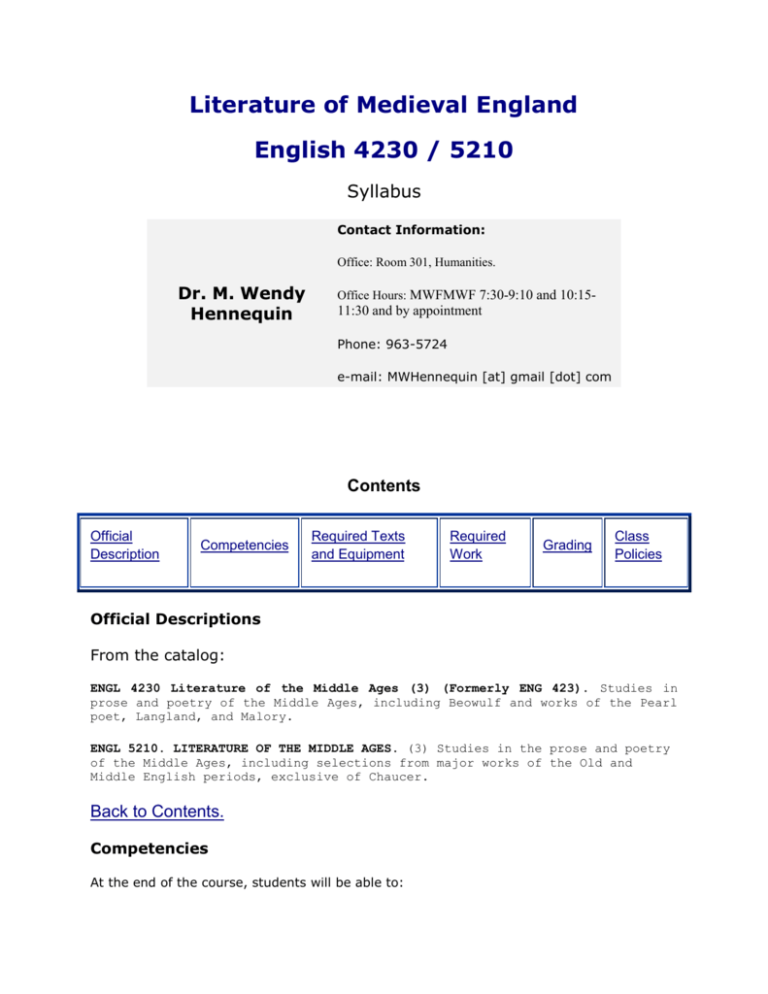
Literature of Medieval England English 4230 / 5210 Syllabus Contact Information: Office: Room 301, Humanities. Dr. M. Wendy Hennequin Office Hours: MWFMWF 7:30-9:10 and 10:15- 11:30 and by appointment Phone: 963-5724 e-mail: MWHennequin [at] gmail [dot] com Contents Official Description Competencies Required Texts and Equipment Required Work Grading Class Policies Official Descriptions From the catalog: ENGL 4230 Literature of the Middle Ages (3) (Formerly ENG 423). Studies in prose and poetry of the Middle Ages, including Beowulf and works of the Pearl poet, Langland, and Malory. ENGL 5210. LITERATURE OF THE MIDDLE AGES. (3) Studies in the prose and poetry of the Middle Ages, including selections from major works of the Old and Middle English periods, exclusive of Chaucer. Back to Contents. Competencies At the end of the course, students will be able to: understand the historical and cultural frameworks of medieval English literature. analyze primary texts from historical and literary perspectives. evaluate historical sources and interpretations. research and analyze a medieval topic. read Middle English competently. Graduate students will also be able to: conduct a review of current scholarship in a medieval topic. write an article-length study or analysis on a medieval text. make a formal presentation of research to the class. Back to Contents. Required Texts and Equipment Greenblatt, Stephen, ed. The Norton Anthology of English Literature, Volume A: The Middle Ages. 8th ed. New York: W.W. Norton, 2005. ISBN: 0393927172. Liuzza, Roy, trans. Beowulf. Unknown city: Broadview Press, 1999. ISBN: 1551111896. Access to the Internet. Many of our texts will be accessible only on-line. Back to Contents. Required Work 1. 2. 3. 4. 5. Readings, as assigned. A mid-term exam. A final exam. A review of a scholarly book. A research project. 6. Participation in class discussions and activities. Your participation forms a significant part of your grade. Participation consists of: o Attendance of class. Yes, I give you a point every day just for showing up. If you show up late, I may give you half a point or no points. o Preparation for class activities, such as reading the assigned texts and commenting on other students' drafts. o Participation in classes and conferences. For each class in which you ask a relevant question or add something relevant to the discussion, you gain a second point. o Meeting with me in my office about class work outside of class or conferences also earns points. o Attention in class. Students who sleep in class, use cell phones or other electronics, send text or e-mail messages, do work for other classes, hold side conversations, or indulge in other distractions will lose any points they gained for that day's class. o Perfect Attendance. Students who attend every class will earn 5 points towards their class participation. o Excessive Absenteeism. Students who miss more than one week's worth of classes (3 on MWF, 2 on TR, etc.) will fail class participation. Students missing more than 2 weeks worth of classes (6 on MWF, 2 on TR, etc.) will earn a 0 in class participation. In addition, graduate students must also complete: 1. An annotated bibliography of scholarship on a medieval literary topic. 2. A research article, in place of the research project. 3. A formal presentation of their work to the class, in the form of a conferencetype paper. Graduate students will not sit exams. Grading Undergraduates Mid-term exam: 25% Final exam: 25% Review: 15% Research Project: 20% Participation: 15% Graduate Students Annotated bibliography: 20% Review: 15% Research Paper: 35% Presentation: 15% Participation: 15% Back to Contents. Class Policies Attending University is a job, an internship which prepares students for their careers. I therefore expect my students to treat the class as a professional commitment, rather than a pastime or a hobby. My class policies emulate the expectations of professionals in the workplace. 1. Attendance is mandatory. o Excused absences. For the purposes of class participation, I will excuse absences only for the following circumstances and only with proper documentation. Death in the immediate family. “Immediate family” includes (step)parents, parental guardians, (step-)sons, (step-)daughters, (step)siblings, and spouses. Serious and extended illness or injury lasting a week or more (such as mononucleosis). University business (team travel, band travel, the Rising Junior exam but not practices, meetings with your advisor, or requirements for other classes). Court appearances required by sub poena or otherwise mandated by the court. Disability-related absences. Students missing more than one week's worth of classes (3 for a MWF class, 2 for a TR) will fail class participation. Students missing more than two weeks' worth of classes (6 for a MWF class, 4 for a TR) will earn a 0 for class participation. See page 29 of the Undergraduate Catalogue for official university policy. 2. Be on time. Tardiness is rude and disrupts the class. If you are tardy, I may give you a half point or no points for attendance and / or participation. 3. Disability. I will make reasonable accommodations for disabled students with documentation from Disabled Student Services. o Students must bring me the accommodation letter from Disabled Student Services by the second week of class. o Absences related to your disability must be documented individually and separately from the accommodation letter. 4. Electronics: Do not send e-mail, text, or instant messages, or surf the Web, or use your cell phone, MP3 player / iPod, laptop, or Blackberry. After 1 warning, I will deduct FIVE POINTS off your FINAL GRADE. 5. Assignments are due at the beginning of class on the due dates. o I do not accept late work unless you have an extension. o If you need an extension, you must request it one class day in advance. o You do not have an extension unless I say you have one. o Each student is allowed one (1) 24-hour emergency extension to cover true emergencies such as computer melt-down, printer failure, or vehicular mishaps. Students must tell me that they are using the extension when the paper is due and must deliver the paper to my mailbox (in Humanities 104) within 24 hours. 6. Make-ups: Class work must be done in class. o In-class writing work, quizzes, discussions, etc. cannot be made up. Students who are excused for the day are excused for the work; all others who miss the class earn a zero for the assignment. o I may allow a student with convincing documentation to make up a major test. o The final exam must be taken during the exam period, and I cannot change the date of a student's exam. This is university policy. 7. Do your own work. The TSU Undergraduate Catalogue says this about academic fraud: Plagiarism, cheating, and other forms of academic dishonesty are prohibited. Students guilty of academic misconduct, either directly or indirectly through participation or assistance, are immediately responsible to the instructor of the class. In addition to the other possible disciplinary sanctions which may be imposed through the regular institutional procedures as a result of academic misconduct, the instructor has the authority to assign an ‘F’ or a zero for the exercise or examination, or assign an ‘F’ in the course. (29) Students submitting any fraudulent work—copied, plagiarized, stolen, bought, cheated, etc.—will receive a ZERO for the assignment, and may receive an F for the course. An important clarification: collaboration is not plagiarism. A person who plagiarizes claims someone else's work for his or her own; people who collaborate on a project claim that they have done the work together and that the work they have done together is their own. You need not credit collaborating colleagues if they proofread, critique, or make suggestions on your work. 8. E-mail: Treat e-mail professionally. o I check my e-mail once daily on weekdays during the semester. o All e-mails must be: polite and professional. well-spelled and grammatically correct. brief. o You may e-mail me to: request an extension (at least one class period before the assignment is due). make an appointment with me. ask about thesis statements or paper topics. request recommendation letters. o I will not respond to e-mails regarding: grades or comments on your papers. (Come to my office to discuss these issues.) missed assignments or notes. (Ask your classmates and / or check the schedule.) technical support. (Call the technical support folks at extension 7777.) questions on assignments, material covered in class, grammar, or citation formats. (Ask in class, so that you get credit for it and everyone gets the answer.) complaints of any sort. o You may not hand in assignments via e-mail. Back to Contents.
